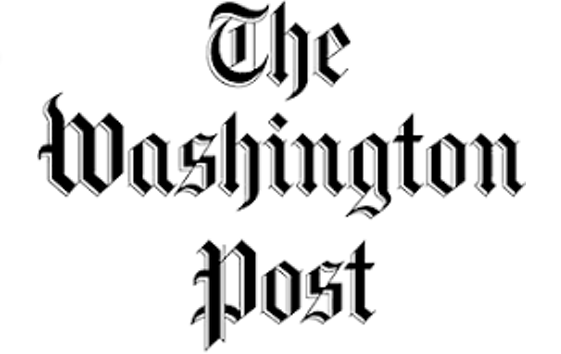 Arsenal Attorneys: A National Firm - Offices in Virginia and California
Arsenal Attorneys: A National Firm - Offices in Virginia and California
Arsenal Attorneys: A National Firm - Offices in Virginia and California
Arsenal Attorneys: A National Firm - Offices in Virginia and California
CONTACT US TODAY
800.819.0608
Frequently Asked Questions About Gun Trusts
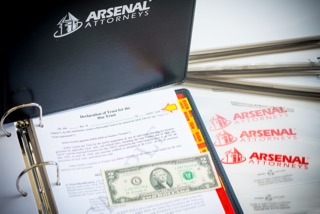 We wanted to address the most frequently asked questions we receive concerning gun trusts. This information will be useful to a variety of people, especially if you're considering an Arsenal Gun Trust, if you're already an Arsenal Attorneys client, or if you need help with a gun trust you obtained elsewhere. Below, we'll address amendments to trusts, what to do if you're moving, how to register new NFA firearms under the new '41F' rules, and how to use a restatement to make a complete revision of your trust using our new Arsenal Gun Trust design--even if you're not already an Arsenal Attorneys client.
We wanted to address the most frequently asked questions we receive concerning gun trusts. This information will be useful to a variety of people, especially if you're considering an Arsenal Gun Trust, if you're already an Arsenal Attorneys client, or if you need help with a gun trust you obtained elsewhere. Below, we'll address amendments to trusts, what to do if you're moving, how to register new NFA firearms under the new '41F' rules, and how to use a restatement to make a complete revision of your trust using our new Arsenal Gun Trust design--even if you're not already an Arsenal Attorneys client.
Amendments. We often receive requests for help with amendments to gun trusts. We're happy to help prepare such documents. Common reasons for amendments include a move, a birth, a marriage, a divorce, a death--or any other major life change that could change your wishes about who may possess and/or inherit your firearms.
Moving. Amendments most often come to mind when people move. If you move, you should make a written statement identifying your new address as the 'place of administration' of your trust. You should also submit ATF Form 5320.20 as required to report your new residence as the location where your NFA firearms are now located. Ignore the fact this form's title refers to interstate travel because it should also be used for permanent relocations, even inside the same state. You may handle these matters yourself, or we're happy to help you. We believe a cost-effective and preferred solution is a 'restatement' per below.
Registering New NFA Firearms. If you wish to register a new NFA firearm, the '41F' regulations would likely require the fingerprints and photographs of other people in your trust. Since late January 2016 our Arsenal Gun Trust has used a new design to minimize the impact of 41F so only you need to provide fingerprints and photographs. Of course, you'll still want to use a trust so that others may have possession of your trust's NFA firearms and your beneficiaries may inherit the trust's NFA firearms without fingerprints, photographs, and a new tax stamp.
Restatement. Instead of an amendment to add/remove people or update an address, and to obtain our new Arsenal Gun Trust before your next NFA registration, we recommend a 'restatement.' It's a complete revision of your existing trust using the new design of the Arsenal Gun Trust we launched in late January 2016. This is available to existing clients at a discount, and we can prepare a restatement for people who obtained a trust elsewhere. If you're not already an Arsenal Attorneys client, a restatement would establish an attorney-client relationship so you enjoy our services and support. These relationships have provided peace of mind to people who previously felt uneasy about the DIY trust they created without the help of a qualified attorney.
Turnkey Package. Our popular Arsenal Gun Trust 'Turnkey Package' is pictured above. This kit organizes your Arsenal Gun Trust documents, and it can serve as the primary filing system for all documents related to your life as a gun owner. In this custom binder system you'll find tabs organizing your trust documents, amendments, tax stamps, receipts, warranties, training certifications, concealed carry documents, hunting licenses, and more. We also include LokSak tactical document bags to protect the trust and tax stamp documents you must store with your NFA firearms. Contact us if you'd like us to prepare a Turnkey Package for you. It will help simplify your life, and in an emergency your successors and beneficiaries will know they can find your important firearms records in your binder.
Contact us to discuss your questions or needs related to gun trusts and NFA firearms. And remember, we can help you with estate planning, business matters, civil litigation, criminal defense, administrative law, personal injury and much more.
Renewing DC Concealed Carry Licenses
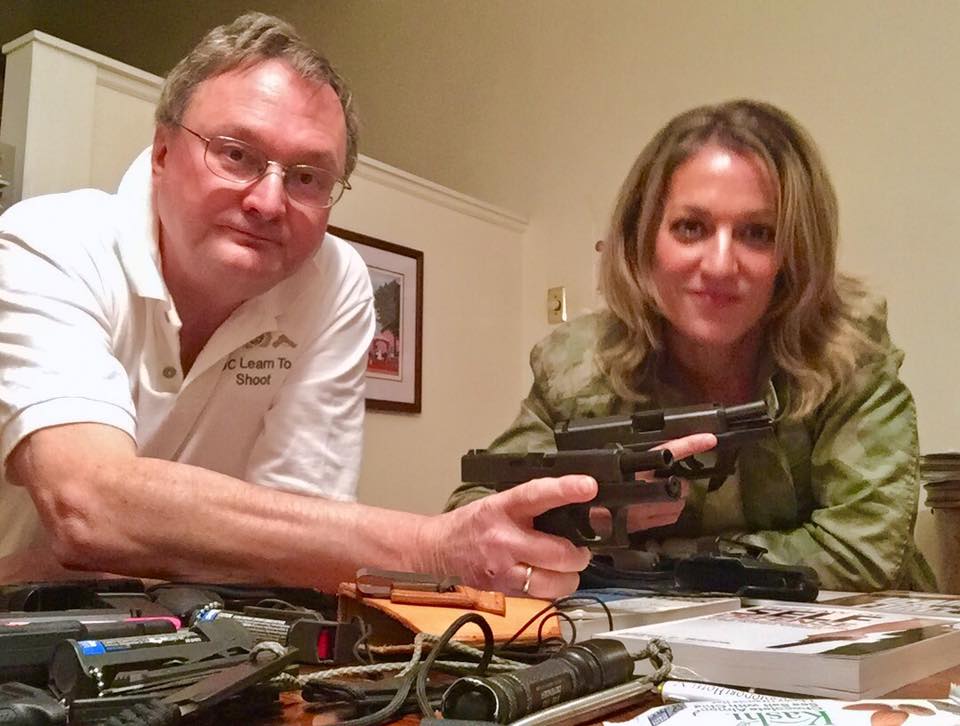 Residents and nonresidents may obtain a Concealed Pistol License (“CPL”) in the District of Columbia, but only if they satisfy very stringent requirements. By now, about 110 applicants have received licenses. D.C.’s concealed carry regime is similar to Maryland’s in that the CPL is only good for two years. So, a Concealed Pistol License holder must apply to renew his or her license every two years. Because the first licenses were issued in early 2015, licenses are now starting to come up for renewal.
Residents and nonresidents may obtain a Concealed Pistol License (“CPL”) in the District of Columbia, but only if they satisfy very stringent requirements. By now, about 110 applicants have received licenses. D.C.’s concealed carry regime is similar to Maryland’s in that the CPL is only good for two years. So, a Concealed Pistol License holder must apply to renew his or her license every two years. Because the first licenses were issued in early 2015, licenses are now starting to come up for renewal.
The District is charging $75 to submit a renewal application. Additionally, the District is requiring each applicant for renewal to meet a training requirement. Thus the applicant for renewal will need to submit proof of an additional 4 hours of classroom training, including training in DC law of self-defense, and 2 hours of range training from an MPD certified concealed carry instructor. The range training has been waived for veterans with comparable experience.
For now, D.C. does not appear to be requiring the resubmission of the extensive documentation required to obtain the initial permit. At least at this stage, the applicant is required to certify that the conditions existing that gave rise to the initial license application still exist. So, for example, if an applicant based his application on carrying large sums of money or other valuable property, the applicant must certify that this is still the case. Submission of fingerprints, etc. required for the original application is also not required for now. The District is running a criminal background check on renewal applications prior to issuing the renewed carry license.
Arsenal Attorneys' George Lyon represents clients in CPL applications, appeals, and renewals, and he is also a DC-certified instructor to provide the training required for applications renewals. He is pictured above with journalist Emily Miller, who received George's help in completing the training for her own CPL. Just like a CPL, George's instructor certification must be renewed every two years at a cost of $400.
You may watch a video of George and Emily discussing DC's arduous process in a video at this link.
ATF Wipes Out Their Own Opinion Letter on ‘Wipes’
Last week manufacturer Dead Air Silencers announced ATF had changed its interpretations of the use and replacement of 'wipes' in silencers by their owners. Previously, industry had relied upon the Bardwell ATF opinion letter (http://www.titleii.com/bardwell/atf_letter66.txt) in which ATF explicitly states:
“In regard to the two parts in your cited example, we consider a
baffle to be a silencer, but a wipe, which is usually nothing more
than a rubber or plastic disc with a hole in it, is generally not
considered to be a silencer. Thus an individual owner could
replace a wipe.”
ATF informed Dead Air it no longer shares the opinion of the Bardwell letter, and asked the silencer manufacturer to immediately cease its unrestricted disribution of wipes. Consequently Dead Air immediately discontinued sales of what were disposable accessory wipes for their products. Dead Air announced they were in the process of developing longer-lasting inserts which even if considered part of the silencer would allow these designs to continue functioning.
We can only speculate why ATF has changed its interpretation of their earlier opinion letter, but it's possible they are preparing to restrict what they see as the next threat to proliferation: home manufacturing of firearms, particularly using 3D printers. It is a felony to manufacture a silencer at home prior to receiving an ATF-issued Form 1 Tax Stamp.
Arsenal Attorneys are concerned not only by the decision to regulate wipes as “suppressor parts” per se, but also with the inconsistency in policy that leaves the public vulnerable to swift and arbitrary changes to the rules.
Matthew Bergstrom Speaking at 20th annual National Firearms Law Seminar
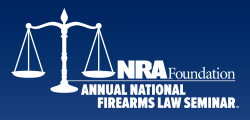 Arsenal Attorneys' Matthew Bergstrom will be one of the speakers at the 20th annual National Firearms Law Seminar during the NRA Annual Meeting in Atlanta on April 28. Early pricing for registration is availalbe through March 31st.
Arsenal Attorneys' Matthew Bergstrom will be one of the speakers at the 20th annual National Firearms Law Seminar during the NRA Annual Meeting in Atlanta on April 28. Early pricing for registration is availalbe through March 31st.
From the event website:
Organized by the NRA's Office of the General Counsel, the National Firearms Law Seminar provides a unique opportunity for attorneys who represent firearms owners and firearms-related businesses to meet and discuss key legal issues relevant to this expanding area of the law. Attorneys in attendance will also earn Continuing Legal Education credit
The 2017 Seminar will include discussions about current constitutional litigation across the country, new federal and state laws and regulations, defending firearms dealers and manufacturers, preventing unjust verdicts in self-defense cases, how best to organize and operate gun ranges and clubs, developing and managing a firearms law practice, and legal ethics. Speakers will include Massad Ayoob, Stephen Halbrook, Professor Nelson Lund, James B. Vogts, James P. Vann from BATFE, Matthew Bergstrom, Judge Richard Dietz of the North Carolina Court of Appeals, Morgan Shields of the NRA Office of the General Counsel, and NRA-ILA Senior Research Attorney Chris Zealand. The special luncheon speaker will be Sandy Froman, former NRA President.
Here is the full agenda of the seminar:
8:00 - 8:20 Registration and Continental Breakfast
8:20 - 8:30 Welcoming Remarks
M. CAROL BAMBERY, Law Seminar Steering Committee Chair, Board Member, National Rifle Association of America, General Counsel, Association of Fish and Wildlife Agencies
8:30 - 10:10 SECTION 1
Second Amendment Litigation: Ongoing Challenges, STEPHEN P. HALBROOK, Ph.D., Attorney at Law/Author
Constitutional Overview of the Second Amendment, PROFESSOR NELSON LUND, George Mason University, Antonin Scalia Law School
10:10 - 10:20 Break
10:20 - 12:00 SECTION 2
Responsibility for Criminal Firearms Violence: Defending Firearm Manufacturers and Retail Dealers, JAMES B. VOGTS, Partner - Swanton, Martin & Bell, LLP
Skirting the Quicksand: How to Avoid Unjust Verdicts in Self-Defense Shootings, MASSAD AYOOB, Massad Ayoob Group, Expert Instructor and Author
12:00 - 1:00 LUNCH, Civil Rights Progress, SANDY FROMAN, Former NRA President
1:00 - 2:40 SECTION 3
Oh Say Can You 501(c): Tax Exemption and Other Compliance Issues for Gun Clubs and Ranges, MORGAN SHIELDS, Assistant General Counsel, NRA Office of the General Counsel
Firearms Law Practice Development and Management, MATTHEW BERGSTROM, Arsenal Attorneys
2:40- 2:50 Break
2:50 - 4:30 SECTION 4
New Federal and State Laws, CHRISTOPHER ZEALAND, Senior Research Attorney, NRA Institute for Legislative Action
Changes to ATF Forms and Regulations, JAMES P. VANN, Division Counsel, Washington Field Division, Bureau of Alcohol, Tobacco, Firearms and Explosives
4:30 - 5:30 SECTION 5: LEGAL ETHICS
Ethical Pitfalls for Busy Lawyers, JUDGE RICHARD DIETZ, North Carolina Court of Appeals
5:30 - 7:00 MEET & GREET: POST-COURSE COCKTAIL RECEPTION
For more details about the seminar, visit this link.
To learn about events throughout the NRA Annual Meeting, visit this link.
Video: Journalist Emily Miller and Arsenal Attorneys' George Lyon Discuss DC Carry License Applications and Renewals
See below video of Arsenal Attorneys' George Lyon and journalist Emily Miller discussing the challenges of obtaining and renewing a District of Columbia Concealed Carry Pistol License. George provided Emily the required 4+ hours of classroom training and 2+ hours of shooting instruction at the range. This discussion took place at the range at the headquarters of the National Rifle Association in Fairfax, Virginia.
Emily wrote about the arduous process of becoming a gun owner in Washington, DC in her book 'Emily Gets Her Gun.' Later she was one of the first people to obtain a DC carry permit. Arsenal Attorneys' George Lyon is a long time Second Amendment litigant in landmark court decisions, including the US Supreme Court's decision in Heller and the more recent Palmer case which compelled DC to issue carry permits to residents and non-residents, albeit with extremely difficult requirements.
Contact Arsenal Attorneys for help with carry permits and other firearms-related legal matters concerning gun owners and the firearms industry. Our firm also provides legal services in business law, estate planning, criminal defense, civil litigation, administrative law, Second Amendment, law, and more.
Arsenal Attorneys' George Lyon Reviews the Rangemaster 2017 Tactical Conference
Arsenal Attorneys’ George Lyon attended the Rangemaster Tactical Conference March 17-19 in Little Rock, Arkansas. Here’s his after action report.
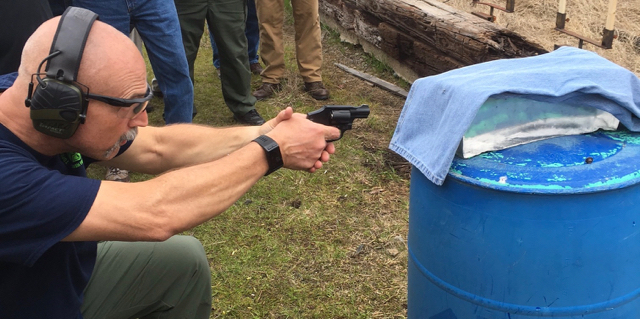 This was my second time attending the conference. Last year I attended in Memphis, Tennessee at the Memphis Police Academy, an excellent venue. This year’s event was at the Direct Action Resource Center, called DARC For short and pronounced ‘Dar-C’, a premier training site for tactical specialists – surrounded by Arkansas swamp – with a shoot house, a Russian chopper situated on a tower for fast roping, an airliner body, sans wings, for hijack scenarios, and a variety of ranges ringing the facility. The facility is best known for its anti-terrorism class, open only to military and law enforcement personnel.
This was my second time attending the conference. Last year I attended in Memphis, Tennessee at the Memphis Police Academy, an excellent venue. This year’s event was at the Direct Action Resource Center, called DARC For short and pronounced ‘Dar-C’, a premier training site for tactical specialists – surrounded by Arkansas swamp – with a shoot house, a Russian chopper situated on a tower for fast roping, an airliner body, sans wings, for hijack scenarios, and a variety of ranges ringing the facility. The facility is best known for its anti-terrorism class, open only to military and law enforcement personnel.
The Rangemaster event, previously known as the “polite society” conference included some of the better known firearm and self-defense instructors in the country, including Massad Ayoob, John Farnam, Marty Hayes, Craig Douglas, Greg Ellifritz, our friend John Murphy from FPF Training, and of course Tom Givens of Rangemaster. A good deal of the conference was devoted to legal issues with Manny Kapelsohn speaking on lessons learned from previous self-defense shooting cases, Skip Gochenour speaking on the role of provocation in defeating a self-defense claim, and Andrew Branca distilling his excellent four-hour class on the law of self-defense into two hours. Mas and Marty spoke on the potential role of a firearms instructor as an expert witness, the class I most anticipated.
In addition to the speakers’ presentations, the ranges were in use all three days, with one devoted to a shooting competition and others devoted to a variety of classes taught by among others John Hearne, Chuck Haggard, and Tom and Lynn Givens. There were also classes on combatives, tactical medicine, and a variety of lectures.
Some of the highlights of the conference for me were Tom Given’s lectures on “Active Killers” and “Defining the Threat” as well as two tactical scenarios. In this blog, I will address Tom’s lectures. In a subsequent blog, I’ll share the learning points from the two tactical scenarios.
Average active killer incident ended by police: 14.29 deaths. Average incident ended by armed citizens: 2.33 deaths.
In both of his lectures Tom stressed a crucial point for survival: carry a gun. He went through a litany of active killer events emphasizing that in each case the killer’s goal was inflicting the highest number of casualties and in each of those events, each of the dead victims had been unarmed. In the vast majority of those cases when confronted with armed resistance the killer either committed suicide or simply gave up. When active killer incidents are ended by police response, an average of 14.29 persons are killed. When active killer incidents are ended by armed citizen response, an average of 2.33 persons are killed. What does that tell you that you need at an active killing event? Tom says it’s clear. “Carry a gun,” he said.
Tom’s lecture on “Knowing the Threat” had a similar theme. The odds say that one in 30 adults will be a victim of violent crime in any particular year. That statistically resolves to a 1 in 4 chance of being a victim of violent crime in one’s lifetime. Women have a 1 in 60 chance of being raped in any one year. Ten percent of violent events happen at home; 90 percent happen someplace else. If you had a 1 in 30 chance of your house catching fire in any one year, would you have fire insurance, a fire extinguisher, a plan for how you would handle a fire? Do you think you need a plan for handling a violent confrontation both inside and outside the home? Do you think that might involve having a gun available at every possible moment? Again, Tom’s advice is to carry your gun.
Interestingly, Tom addressed statistics suggesting a drop in crime. He acknowledged that the murder rate is down, but explained that is a function of advanced trauma care. When you don’t die, the police don’t call it attempted murder, they call it aggravated assault. The result of an aggravated assault can leave you blind, substantially incapacitated, paralyzed, bankrupt from medical expenses, etc. Admittedly, better than dead, but maybe not so much. Just “carry your gun,” Tom repeated.
Finally, Tom discussed the experience of persons who had taken Rangemaster’s training. There have been 66 known gun fights involving Tom’s students over the years. Sixty of these students have escaped without injury, three had injuries, and three were forfeits. What did he mean by forfeit? They were murdered by an armed robber while they were unarmed. In Tom’s words, the lesson should be clear. “Carry your gun.”
Like George Lyon, Arsenal Attorneys™ team includes lawyers who are certified firearms instructors, federal firearms licensees, former law enforcement, and criminal defense attorneys, particularly for self-defense cases. Our attorneys are available for personal consultations in self-defense law for gun owners, which we offer at our offices or by phone or video conference nationwide. The firm also offers legal services in business law, estate planning, civil litigation, personal injury and other areas of law.
CONTACT OUR FIRM
CONTACT US TODAY
Arsenal Attorneys is committed to answering your questions about estate planning, firearms, business law, litigation, and criminal defense issues.
We'll gladly discuss your case with you at your convenience. Contact us today to schedule an appointment.
LOCATION
4000 Legato RoadSuite 1100
Fairfax, VA 22033
800.819.0608

